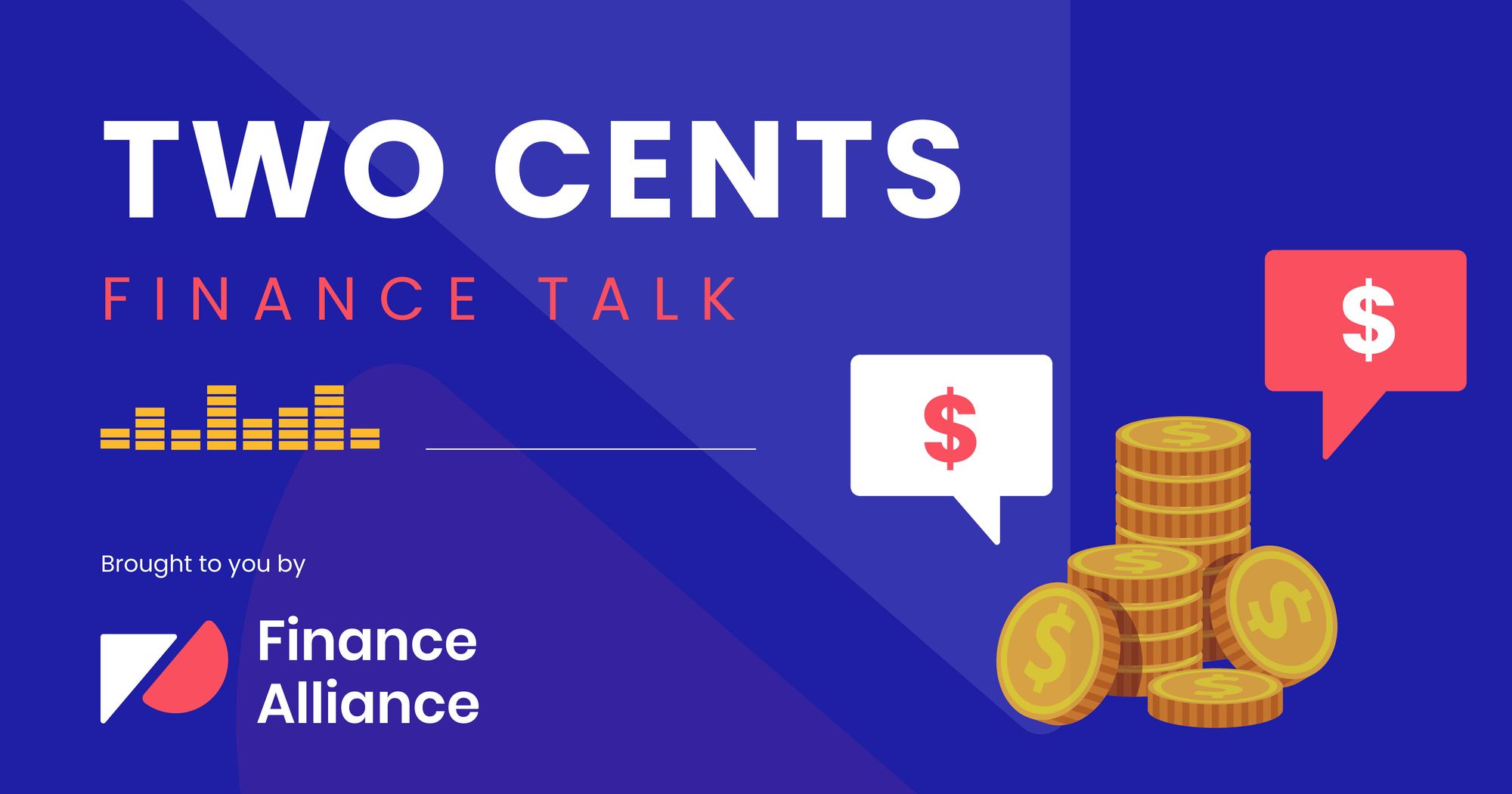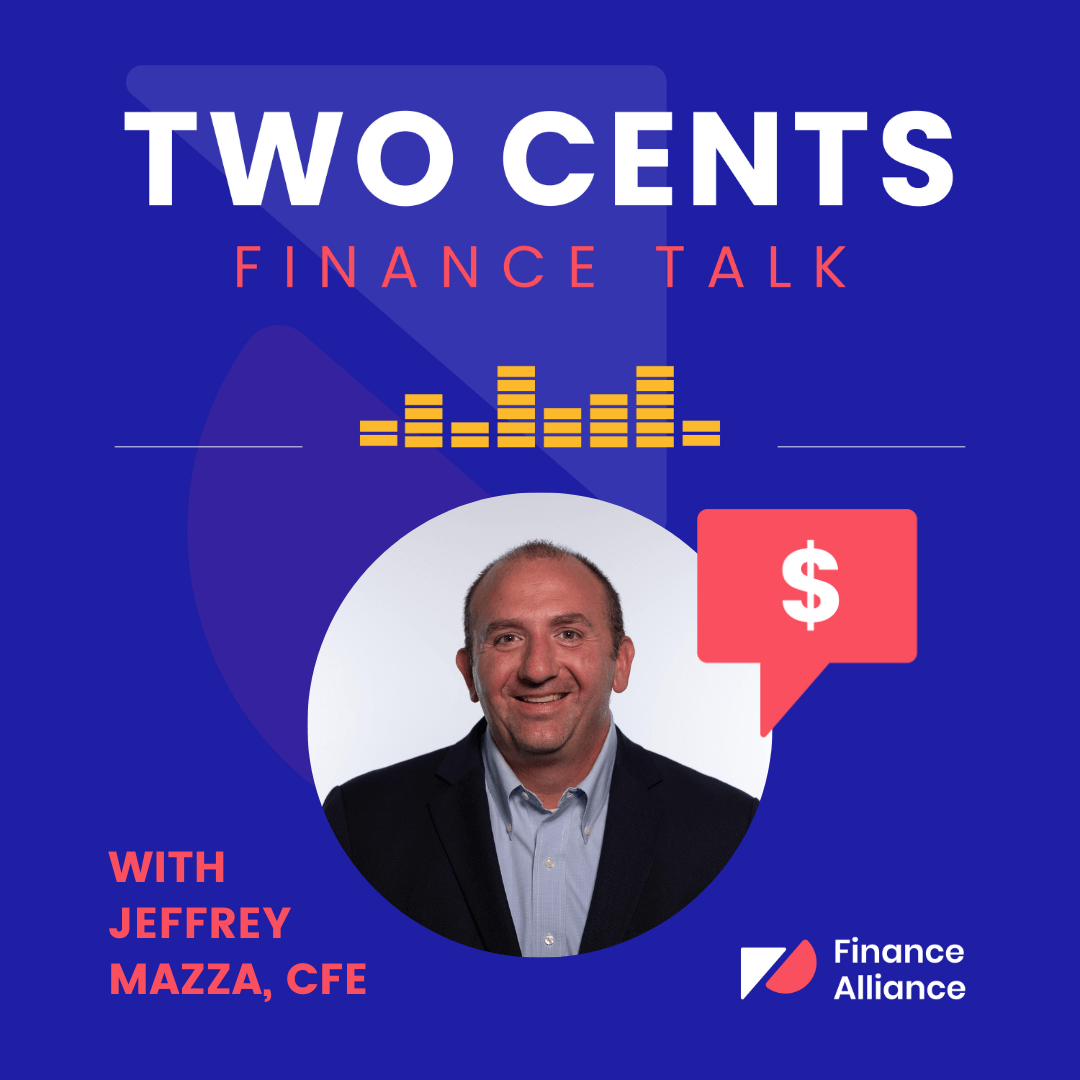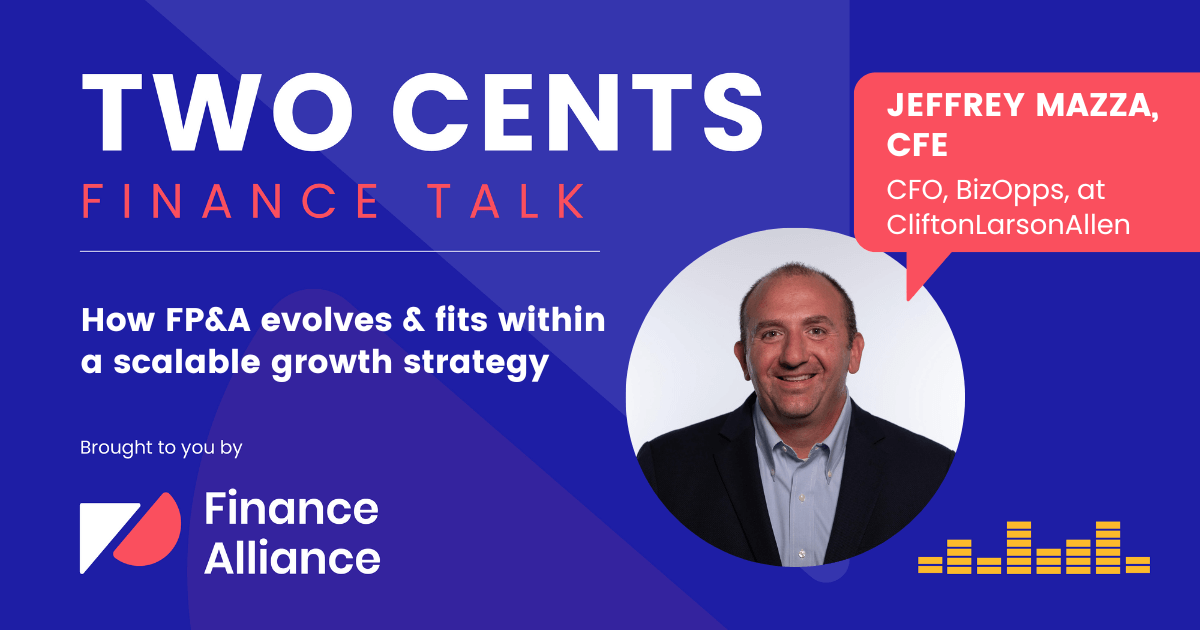As small businesses scale, the role of financial planning and analysis (FP&A) evolves and becomes increasingly important. But where exactly does FP&A fit within a scalable growth strategy?
In this post, we're sharing insights from a recent episode of the Two Cents: Finance Talk podcast, where we sat down with Jeffrey Mazza, CFO in the BizOps group at CliftonLarsonAllen.
In the episode, we explored how FP&A evolves and fits within a scalable growth strategy. Jeffrey shared his expertise on the subject, revealing practical insights on how small businesses can use FP&A as part of a scalable business model.
So, whether you're a seasoned CFO or just starting to dive into the world of finance, this one is for you!
Listen to the full episode below:
Or keep reading to see what Jeffrey has to say about FP&A and scalable growth.
Topics covered:
- Where FP&A fits within a scalable business model
- How small businesses use FP&A to help them scale
- How the FP&A function evolves as the business grows
- How the way in which companies use FP&A has changed since Covid-19
- Key traits and skills of a successful FP&A team
- Tips for FP&A teams to help drive business growth
Q. Where does FP&A fit within a scalable growth strategy or business model?
I believe that it's front and center and that’s the way it should be. FP&A has changed over the years and maybe I would’ve given a different answer 10 or 15 years ago. But FP&A has grown, and I think there's been a lot of education around what FP&A is in general.
When you look at what FP&A can do, both internally and externally, it’s powerful. As the business grows and scales, it becomes even more important to not only utilize FP&A but develop good teams around it to interpret data to help the business scale and grow.
Q. How can small businesses use FP&A to help them scale?
A lot of our clients, especially the smaller business, might not know what FP&A is. But once you start to dive into it, their eyes light up and it's so powerful because you can use this both internally and externally.
"What I mean by that is, when you’re looking at your own current scalable processes within a company and provide the analysis, you’ll find critical drivers that help identify even little decisions that have big impacts."
Externally, FP&A helps navigate where a company is going. It puts a financial plan in place to be able to achieve growth goals. And, there's a lot of uncertainty in this current environment, and being able to help navigate through rough waters is very critical nowadays.

Q. How does the FP&A function change or evolve as the business grows?
This can start off very simple for small businesses, but as FP&A grows, your business grows. I believe that the FP&A function should be able to adapt to that. And, that could involve building out additional teams, but even as you grow, there starts to be a lot more analysis that might take place.
For example, if a company is looking to 5x the top and bottom line over the next few years, it sounds like pretty aggressive growth goals and what does that even look like?
Can your production facility even process the number of units that might be coming through there?
It might lead to performing a deep dive on an analysis of your own current internal processes, as well as production to see if you can even handle that growth. And you might make some decisions based on the analysis such as obtaining another facility, or more staff to help identify what the business needs.
However, you can also look at FP&A as your business grows and ask how we can be more efficient to be able to achieve that growth. From there, you can look at the current processes, and start to make some tweaks along the way.
Then, as you grow, you're going to need some sort of technology, because the technology today is very powerful, and can adapt rapidly.

Q. Since COVID-19, do you think that how companies use FP&A has changed?
COVID-19 really affected the entire global landscape. It wasn't just directed to one area. So that meant, at least for me, having conversations with fellow financial executives, and realizing that no one was really planning for something like this.
After all, how can you plan for a global pandemic to disrupt the global economy?
But everyone kind of shifted and had to consider things on a much deeper level. When the lockdown happened, we needed to know how much cash we had. Those are some of the discussions that other businesses were having. And as I mentioned, you can't really plan for that.
I think the pandemic really opened the eyes of business owners to say, “what if?” What if one of these scenarios comes around, again, do we have options to handle it? Should another pandemic happen, I feel like people are aware of the real downside of that now.
"It really opened our eyes to better planning and making sure that the business can navigate through rough waters."
In my opinion, the way that FP&A has changed since the pandemic is that it’s really accelerated a lot of businesses to be more open and adapting to not only having FP&A as part of their business, but making it way more robust to be able to help navigate through some of these rough waters that could be around the corner.
Q. What are some of the key traits and skills of a successful FP&A team?
Good FP&A teams have evolved over the years, and you're starting to see more and more focus on FP&A from businesses and people are very interested in that.
To me, a skilled FP&A team is about development as well as looking for that talent that's beyond the core finance capabilities.
"Bringing a good FP&A team together that can think outside the box is important, but it takes more than that. Your team really needs to understand the business, the industry, and how the FP&A team can help identify efficiencies of processes and offer better recommendations using that data to really elevate the FP&A team."

Q. Do you have any tips or advice for FP&A teams to help drive business growth?
I look at it as three areas you need to prioritize:
1. Internal
You need to look at the internal processes that you can prove helps drive performance. Not only that but evaluate any existing processes that really identify the critical drivers and performance of the company and analyze them.
Are there any efficiencies that can take place? And that's using FP&A to help with the analysis of those processes. Also, consider if there's any automation and if there are any areas in that you can make small tweaks to have big impacts.
2. Technology
The technology that’s out there today is powerful. We went from just moving a lot of manual processes. For example, think about the budgeting process. Everyone's used to Excel sheets with lots of going back and forth, which leaves room for human error.
Recently, we have had more options such as AP automation and RPA. Now, we have AI and that's even a step further than RPA. It’s remarkable that with this type of technology, you can access even deeper insights.
Using AI and ML, you can identify trends that the human eye can’t always see and it's powerful. More importantly, you can use that technology to utilize efficiencies and speed. Nowadays, people want their data in real-time to be able to make better-informed decisions based more on data and less on intuition.
3. Teams
The final piece is developing your core team, which will require some training. But finding that talent that’s beyond the core finance capabilities is so important.
"You need to build a team that really understands the business, the industry, and the drivers that affect the business itself."
And even when a scalable growth strategy is in place, you still need to include solid financial plans to go along with the business growth goals.

About Jeffrey Mazza
Jeffrey Mazza is the Greater Chicagoland Office Leader and CFO in the BizOps group at CliftonLarsonAllen. CLA creates opportunities for businesses, individuals, and communities through our wealth advisory, outsourcing, audit, tax, and consulting services.
Jeffrey brings with him over 20+ years of experience in senior financial and operational leadership roles. He has a measurable history of helping businesses succeed by designing and executing growth strategies and capitalizing on opportunities to accelerate profitability through effective financial planning and analysis. He also brings extensive experience in developing both financial and operational infrastructure in early-stage companies.
Jeffrey serves as a steering committee member at The CFO Leadership Council, a member of the Association of Certified Fraud Examiners, and the CFOrward Group. He is also an active volunteer and a board member of The GALF LLC.
He earned a bachelor’s degree in finance from the University of Massachusetts, Amherst, and attended the MBA program at DePaul University Charles H. Kellstadt Graduate School of Business. Jeffrey also holds the CFE (Certified Fraud Examiners) designation.



 Follow us on LinkedIn
Follow us on LinkedIn




